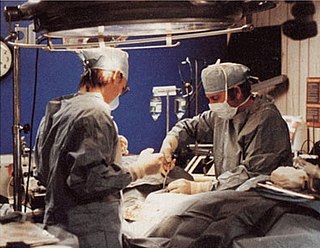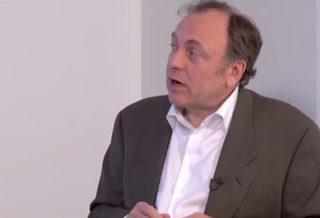
Cryonics is the low-temperature freezing and storage of human remains, with the speculative hope that resurrection may be possible in the future. Cryonics is regarded with skepticism within the mainstream scientific community. It is generally viewed as a pseudoscience, and its practice has been characterized as quackery.

Immortality is the concept of eternal life. Some species possess biological immortality.
The Alcor Life Extension Foundation, most often referred to as Alcor, is an American nonprofit, federally tax-exempt, 501(c)(3) organization based in Scottsdale, Arizona, United States. Alcor advocates for, researches, and performs cryonics, the freezing of human corpses and brains in liquid nitrogen after legal death, with hopes of resurrecting and restoring them to full health in the event some new technology can be developed in the future. Cryonics is regarded with skepticism within the scientific community and has been characterized as quackery and pseudoscience.

Robert Chester Wilson Ettinger was an American academic, known as "the father of cryonics" because of the impact of his 1962 book The Prospect of Immortality.

Michael D. West is an American biogerontologist, and a pioneer in stem cells, cellular aging and telomerase. He is the founder and CEO of AgeX Therapeutics, a startup focused on the field of experimental gerontology.
James Hiram Bedford was an American psychology professor at the University of California who wrote several books on occupational counseling. He is the first person whose body was cryopreserved after legal death, and remains preserved at the Alcor Life Extension Foundation.
The American Cryonics Society (ACS), also known as the Cryonics Society of America, is a member-run, California-based, 501(c)(3) tax-exempt nonprofit organization that supports and promotes research and education into cryonics and cryobiology. Cryonics is the low-temperature freezing and storage of a human corpse or severed head, with the speculative hope that resurrection may be possible in the future.
Michael G. Darwin, formerly known as Michael Federowicz, is the former president of the cryonics organization Alcor Life Extension Foundation. He was president from 1983 to 1988, and Research Director until 1992. He was also the founder and president of BioPreservation, Inc., and a cofounder, member of the Board of Directors, and Director of Research of Twenty-First Century Medicine from 1993 to 1999.
Jerry Donnell Leaf was Vice President and Director of the cryonics organization Alcor Life Extension Foundation, and President of the cryonics service firm Cryovita, Inc. until his death in 1991.

The Michigan Life Sciences Corridor (MLSC) is a $1 billion biotechnology initiative in the U.S. state of Michigan.
Curtis Henderson was a pioneer in the practice of cryonics.
Frederick Rockwell Chamberlain III and Linda Chamberlain founded the cryonics organization Alcor Life Extension Foundation. Their long and continued history of activism in cryonics make them among the most well-known cryonics pioneers. David Pascal wrote in the November/December 2005 issue of the Mensa Bulletin that, second to the man credited with the original idea for cryonics, Robert Ettinger, the Chamberlains have contributed more than anyone to the field of cryonics.
KrioRus is the first cryonics company in Russia. It was founded in 2005 by the Russian Transhumanist Movement NGO. It is the only cryonic company in Europe to possess an own cryonic storage. The company offers the services of freezing the entire bodies or heads of clients in liquid nitrogen with a plan to revive them if such a technology is developed, but takes no legal obligations to do so.

The Vattikuti Urology Institute (VUI) at the Henry Ford Hospital in Detroit, Michigan, is a clinical and research center for urological care.
Dora Kent was the subject of a 1988 legal controversy about whether she had been murdered to facilitate her cryonic suspension. She was Alcor's eighth patient and the oldest at that time to ever be cryopreserved. She was the mother of Saul Kent, a board member of Alcor. In her earlier years, Kent worked as a dressmaker in New York City.
The Life Extension Society (LES) with its network of coordinators was the first cryonics organization in the world. It was founded by Evan Cooper in 1964 to promote cryonic suspension of people, and became the seed tree for cryonics societies throughout the US where local cryonics advocates would meet as a result of contact through the LES mailing list. The original LES ceased existence near the end of the 1960s, but an organization with the same name and similar objectives was incorporated in Maryland in 1992.
Bhakta B. Rath is an Indian American material physicist and head of the Materials Science and Component Technology of the United States Naval Research Laboratory (NRL), the corporate research laboratory for the United States Navy and the United States Marine Corps. He is the chief administrative officer for program planning, interdisciplinary coordination, supervision and control of research and is the associate director of research for Materials Science and Component Technology at NRL.
Shirley Ellen Schwartz or Ellen Shirley Schwartz was a chemist and research scientist at General Motors, specializing in the study and development of industrial lubricants and automobile oil change indicator systems. She was inducted into the Michigan Women's Hall of Fame in 1996 for her accomplishments in the field of chemistry.
Cryonics Institute (CI) is an American nonprofit foundation that provides cryonics services. CI freezes deceased humans and pets in liquid nitrogen with the hope of restoring them with technology in the future.
The Shandong Yinfeng Life Science Research Institute, is a life science research institute and a cryonics services provider in Jinan, Shandong, China. It was founded in 2015, and it is a division of Yinfeng Biological Group. The institute is the first organization providing cryonics services in China. In 2017, the institute made the first cryopreserved patient in China. The institute cryopreserves cells, tissues, human bodies, and animals, including dogs. The institute cooperates closely with the Shandong Yinfeng Life Science Foundation that funds the institute.






